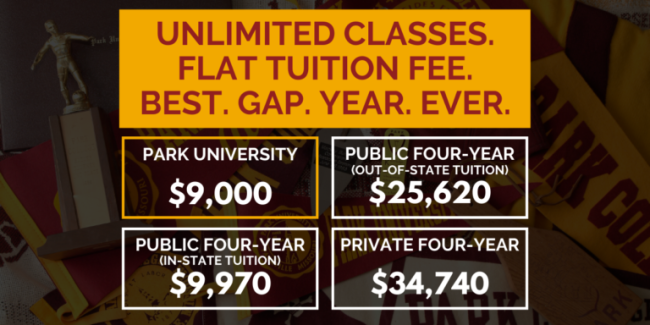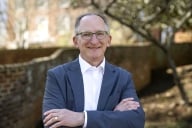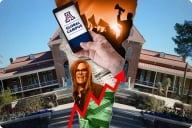You have /5 articles left.
Sign up for a free account or log in.

Park University
As college campuses prepare for an uncertain fall semester, students face difficult decisions about their futures, too. Should they go back to campus in the middle of a pandemic? Should they keep studying remotely? Or should they take a break from their studies and wait for things to hopefully go back to normal?
The latter option is one that worries Greg Gunderson, president of Park University, a multilocation private nonprofit institution headquartered in Parkville, Mo. He is concerned students who decide to take a temporary break from their education won’t return. He worries students who defer their studies may join the ranks of the 36 million Americans with some college, but no degree.
“People get distracted and they move on,” Gunderson said. Rather than take a year off from their studies, Park University is encouraging students to take a different kind of gap year -- one where they can continue their studies online from the safety of their home and possibly save some money on their education in the process.
Park University’s gap year initiative, launched earlier this month, offers students the opportunity to transfer to Park and study online for a flat tuition of $9,000 for the 2020-21 academic year -- a discount of roughly $2,200 off Park University’s regular tuition rate.
The goal of the gap year program is to keep students engaged in their education during a challenging time and get them back to their original home institution to graduate, Gunderson said. "We think as long as there is a risk that students' face-to-face experience will be interrupted or families are concerned about the health of their students, the program will have some interest," he said.
Park offers over 70 fully online degree programs and is well placed to offer a quality remote learning experience, Gunderson said. Several surveys have indicated students across the country did not highly rate their experience of switching to remote learning in the spring semester due to COVID-19. Survey data also suggest many students do not think they should have to pay face-to-face prices for remote instruction. Park advertises its offerings as competitively priced and “online on purpose.”
“Park University has been at the forefront of online education for 25 years. We didn’t have to scramble to make online education work. We were already there. And we don’t convert campus classes to an online format -- we build them from the ground up, intentionally designing every lesson and every assignment for online learning and real-world success,” reads the website advertising Park’s gap year initiative.
Gunderson hopes Park’s online offer will attract new students to the institution "even if they're not ultimately our students" because he feels it is the "right thing to do." Students who already study on campus at Park may apply to study completely online with the gap year discount, but only 50 spots have been saved for these students. Most campus-based students will take part in a mixture of face-to-face and remote instruction when they return to campus this fall -- something many already did before the pandemic.
Despite having a lot of flexibility to offer different learning options, leaders at Park University shared that the institution is projecting lower than usual enrollment on its campus this fall.
“Due to the impact of COVID-19, we are experiencing a decrease in the overall enrollment for summer and we can expect the same for fall enrollment compared to the same time last year,” said Long Huynh, associate vice president for marketing and strategic growth, in an email. “This is certainly a scary time for higher education. No one really knows what yields (the percentage of admitted applicants who enroll) will be this year as there are so many factors impacting decisions being made by students.”
Those who watch the online education market see Park's program as a campaign to enroll more online students to compensate for a potentially challenging year ahead, rather than a philanthropic exercise.
“I don’t blame Park, which I’m sure is facing unprecedented enrollment challenges. But this [gap year initiative] is nothing more than a marketing campaign for Park’s online programs,” said Ryan Craig, co-founder and managing director of the higher education investment firm University Ventures, in an email. “The goal, of course, is to try to retain students who respond to the marketing campaign. I don’t envy the students who will face a barrage of ‘continue your education with Park Online’ messages starting this fall.”
The gap year offered by Park University is not a gap year in the traditional sense, since there is no focus on developing core skills or career discovery, Craig said. The initiative is also “not a new or different product,” he said. Many online-first universities such as Western Governors University, Southern New Hampshire University or Ashford University could advertise their programs in the same way.
One of the advantages of the Park University offer is the ease with which students can transfer credits between institutions, Gunderson said. Park University is accredited by the Higher Learning Commission, and many students have transferred their credits to other institutions with no problem, he said.
“Like all online programs -- or most community colleges enrolling students who aim to transfer -- the proof is in the pudding, and the pudding tasters are departments and faculty at destination institutions,” Craig said. “Park’s claim that ‘unlike what you get through a community college, the hours you earn here transfer easily to any accredited college or university’ seems questionable at best.”
Tamara Hiler, director of education at the think tank Third Way, also expressed concern about how easy Park University made transferring credit seem. “The reality is that credits don't necessarily transfer even between schools that are under the same accreditor. A lot depends on all the individual articulation agreements that these schools have," she said.
Not all colleges make it easy for students to defer their studies and some students may not understand this before they act, said Hiler. "Students may think they can leave and come back, but they may have to reapply for admission to their own school as a transfer student and try and verify if the credits they earned will be accepted," she said.
The decision to transfer to Park is not one that students should make without first discussing with an academic adviser, said Gunderson, responding to this concern.
“I would agree students will need to talk with the institution they intend to transfer their credits to, to address up front that the classes they take with Park University will move them closer to their ultimate graduation,” Gunderson said. “At the same time, we are concerned that if students drop out for a year, they may never go back to their degree.”
The way in which Park is advertising this gap year initiative is troubling to Hiler, who said the webpage for the program “reads like an infomercial.” She encourages students who are considering transferring to Park to investigate claims the institution makes about quality and look closely at the institution’s graduation rate -- 17 percent of part-time, non-first-time degree-seeking undergraduates who enrolled at Park in the 2011-12 academic year had received a bachelor's degree eight years later, according to federal data, while another 45 percent had enrolled at a different institution. Among such undergraduates who attended full-time, 45 percent had received a bachelor's degree.
Park's gap year program may be a good fit for some students, but Hiler worries that predatory for-profit colleges may copy the model.
Other institutions offering discounted online tuition to temporary transfer students does seem likely, said Gates Bryant, a partner at Tyton Partners, an investment banking and strategic consulting firm focused on education. “This is an interesting model and I think there will be more of this,” he said in an email. “In addition to the tremendous uncertainty stemming from the pandemic, an equally relevant factor for this type of model [is] the new professional standards for admissions that allow for institutions to more explicitly market to transfer student populations.”
The program has received positive interest from potential students and college administrators curious about the program, said Gunderson. He acknowledges that not all college leaders have warmly received news of the program. He stresses, however, that the intent behind the initiative is not to steal students from other institutions, but to “help students grow where they are planted” and fill the "unique need that COVID has created."
“While I cannot speak for other schools, Park’s goal is to help students and families through this crisis with a high-quality and value-price option that keeps them moving forward,” said Gunderson. “Park University is willing to partner with any nonprofit institution and share our approach and our classes to assist them. All of American higher education is impacted by this challenge, so we have to leverage each other’s strengths to meet the needs of our students.”








